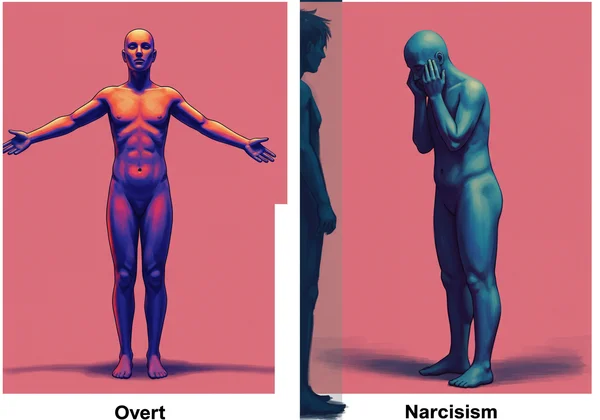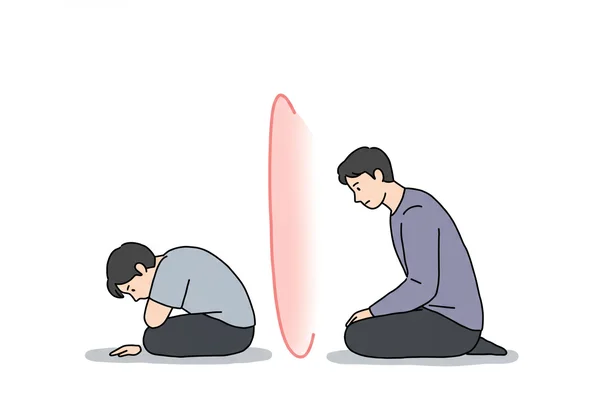潛藏型自戀測試與跡象:您的全面應對策略指南
July 27, 2025 | By Rowan Thorne
您是否總是對某些看似謙遜、卻在每次談話或情況中微妙地主導他人的人感到困惑或情緒耗竭?您可能正在面對 潛藏型自戀 (covert narcissism),這是一種細膩且常被忽略的自戀形式,比其更明顯的類型更難察覺。本指南將深入探討其微妙的跡象、對人際關係的影響,以及助您識別和有效應對的實用策略。您甚至可能自問:「我怎麼知道自己是否有自戀傾向?」或這些模式是否適用於您身邊的親近之人。
理解這些複雜的模式是邁向清晰與更健康互動的第一步。對於那些希望開始這段自我反思之旅的人來說,一個結構化的評估可以提供寶貴的初步洞見。您可以透過我們免費、受科學啟發的個人探索工具 探索您自身的特質。

理解潛藏的自戀者
「自戀者」一詞常常讓人聯想到那些過於傲慢、自以為是且需要關注的人。然而,這僅描述了自戀光譜的一面。潛藏的自戀者,或稱隱藏型自戀者,他們以感知到的脆弱感和靜默的優越感來運作,使得他們的操縱行為更難以辨識。
什麼是潛藏型自戀?
潛藏型自戀,有時也被稱為脆弱性自戀 (vulnerable narcissism),是一種性格特質,其特徵是根深蒂固的權利感和自我重要感,但外表卻是害羞、不安全或自我貶低的。與那些要求讚賞的外顯型自戀者不同,潛藏型自戀者傾向於透過同情和扮演受害者來尋求讚賞。他們的內心世界充斥著被誤解和不被欣賞的感受,這助長了怨恨和被動攻擊的行為。
外顯型 vs. 潛藏型自戀:關鍵差異
理解區別對於識別至關重要。雖然兩種類型都具有以自我為中心和缺乏同理心的核心特徵,但他們的表現方式卻截然不同。可以將其視為達成相同目標——驗證他們脆弱的自我認同——的兩種不同策略。
-
尋求關注: 外顯型自戀者是愛誇耀、主導談話的人。潛藏型自戀者則透過戲劇性地嘆氣、被動地評論他們的困境,或巧妙地將談話引導回他們自身未被認可的才能或艱辛經歷來吸引關注。
-
對批評的反應: 外顯型自戀者很可能會以憤怒和敵意回應。潛藏型自戀者則可能帶著受傷的表情內化批評,對您置之不理,或事後將其作為他們遭受不公待遇的證明。
-
社交行為: 外顯型自戀者更有可能內向,顯得孤僻或有社交焦慮,但內心卻評判著周圍的每一個人。

識別脆弱性自戀的跡象
識別潛藏型自戀需要關注微妙、一致的模式,而不是單一、明顯的行為。這些個體已經掌握了隱藏的自我沉迷的藝術,讓周圍的人感到內疚、困惑,並對他們的不快樂感到負責。
應注意的微妙行為與情感模式
這些跡象常常包裝在敏感和脆弱的外衣之下。他們可能對被感知到的怠慢極度敏感,為微小的事件而懷恨多年。他們也可能表現出深刻的同理心缺失,聽您的問題只是為了將談話轉向您的狀況如何讓他們想起自己更為嚴重的痛苦。這種情感不被認可模式是一個關鍵的警示信號。
受害者心態與被動攻擊
潛藏型自戀者 的核心特徵是持續的受害者心態。錯永遠不在他們身上;生活、他人和環境總是他們失敗或不快樂的罪魁禍首。這通常伴隨著被動攻擊——一種間接表達負面感受的方式。例如,冷暴力 (silent treatment)、不真誠的讚美,以及「忘記」做承諾的事情,所有這些都是為了在不直接對抗的情況下懲罰您。
這是潛藏型自戀嗎?我們的測試探討了什麼
應對這些行為可能會令人困惑。您可能會想,自己是否太過敏感,或者這些特質是否也存在於您自身。初步的 潛藏型自戀測試 可以為自我反思提供有用的起點。我們 免費自戀測試 中的問題受到自戀型人格量表 (Narcissistic Personality Inventory, NPI) 的啟發,探索了各種特質,包括過度敏感、權利感和對讚賞的需求,這些都與外顯型和潛藏型自戀者相關。
潛藏型自戀對人際關係的影響
與潛藏型自戀者建立關係——無論是浪漫、家庭還是職場關係——通常是對您自尊心和現實感的緩慢而令人困惑的侵蝕。他們微妙的操縱技巧讓您質疑自己的認知和理智。
信任的侵蝕與情感操縱技巧
當您意識到與您在一起的人不斷編造受害者的敘事時,信任就會瓦解。他們可能會利用罪惡感來控制您的行為,讓您對他們的情緒狀態感到負責。隨著時間的推移,您可能會發現自己如履薄冰,小心翼翼地管理自己的言行,以避免激發他們受傷的反應。這種令人筋疲力盡的動態使得真誠的連結變得不可能。
應對冷暴力與罪惡感操縱
冷暴力是一種強大的被動攻擊性控制形式。它是一種懲罰性的行為,旨在讓您感到焦慮並渴望重新獲得他們的認可。同樣地,罪惡感操縱是利用您的同情心來讓您順從。將這些識別為操縱技巧,而不是真誠的傷害表達,是脫離這種循環的第一步。學習如何 理解這些模式 是保護您心理平和的關鍵。
應對潛藏型自戀的策略
一旦您識別出這些跡象,您就可以開始保護自己並重拾您的情感健康。應對潛藏型自戀 的重點不在於改變對方,而在於改變您與他們互動的方式。
對潛藏型自戀者設定健康的界線
界線是您最重要的工具。這意味著清晰、平靜地陳述您的底線以及侵犯這些底線的後果。例如,您可以說:「當您準備好尊重地與我交談時,我很樂意討論這件事,但我不會回應冷暴力。」要為他們測試這些界線做好準備,但堅持不懈是奪回您力量的關鍵。

優先考慮您的心理與情感健康
與潛藏型自戀者互動非常耗費精力。建立一個不在該關係之外的堅強支持系統至關重要。與信任的朋友重新聯繫,從事能建立您自我價值的愛好,並練習自我關懷。提醒自己,您沒有責任管理另一個成年人的情緒。如果您正在質疑您自身的特質,現在是時候 進行評估 以獲得個人洞見。
何時為複雜的關係尋求專業支持
如果您與潛藏型自戀者處於一種深度糾纏的關係中,單憑自己的力量來處理這種關係動態可能會非常困難。一位專門從事人格障礙的治療師或諮商師可以為您提供工具、驗證和一個安全的空間來處理您的經歷。他們可以幫助您加強您的界線,並在必要時制定一個疏遠這種關係的策略。
揭示潛藏模式:您的下一步
識別潛藏型自戀的微妙跡象是重掌控制權的有力一步。它釐清了令人困惑的動態,並賦予您理解的力量。無論您是識別出他人身上的這些特質,還是探索自己內心的這些特質,知識永遠是積極改變的第一步。

理解人格的旅程是複雜且深刻個人的。如果本文引起您的共鳴,請考慮採取下一步。我們免費、保密的測試,受到 NPI 的啟發,可以為教育和自我反思的目的提供這些特質的初步視角。它不是診斷,而是幫助您讓探索變得更容易、豐富您的生活的工具。開始您的自我發現之旅。
關於潛藏型自戀與測試的常見問題
潛藏型自戀者的特徵有哪些?
主要特徵包括靜默的優越感、對批評的過度敏感、受害者心態、缺乏同理心、被動攻擊性行為以及傾向於懷恨在心。他們通常顯得害羞或自我貶低,但內心深處卻懷有權利感和嫉妒感。
我怎麼知道自己是否有自戀傾向?
真正的自我反思很難,但質疑這一點是一個積極的跡象。您可以從審視您對批評的反應、您的同理心能力以及您是否感到持續尋求讚賞的需求開始。為了更結構化的了解,線上篩查工具可以提供自戀特質的初步洞見,而這些特質對每個人來說都存在一個光譜。您可以透過我們免費的評估 獲得一些清晰的認識。
自戀與 NPD 的區別是什麼?
自戀是指每個人在某種程度上都擁有的性格特質光譜,從健康的自信到不健康的自我中心。自戀型人格障礙 (NPD) 是 DSM-5 定義的正式臨床診斷。它代表了一種普遍且僵化的誇大、需要讚賞以及缺乏同理心的模式,嚴重影響了功能。我們的測試篩查的是特質,而非疾病本身。
自戀者能改變他們的行為嗎?
改變是可能的,但極具挑戰性,因為它需要高度的自我意識和真正的改變意願。對於具有強烈自戀特質或 NPD 的人來說,核心人格結構是根深蒂固的。持久的改變通常需要與專門從事人格障礙的專業人士進行長期、密集的治療。
如何在關係中應對自戀者?
與自戀者打交道需要堅定的界線、情感上的抽離(例如「灰色岩石法」),並優先考慮您自己的心理健康。重要的是要理解您無法「修復」他們。專注於您可以控制的事情:您的反應和您的選擇。進行 我們的 NPI 基礎測試 也可以幫助您了解您正在處理的特質,無論是您自己還是您的伴侶。